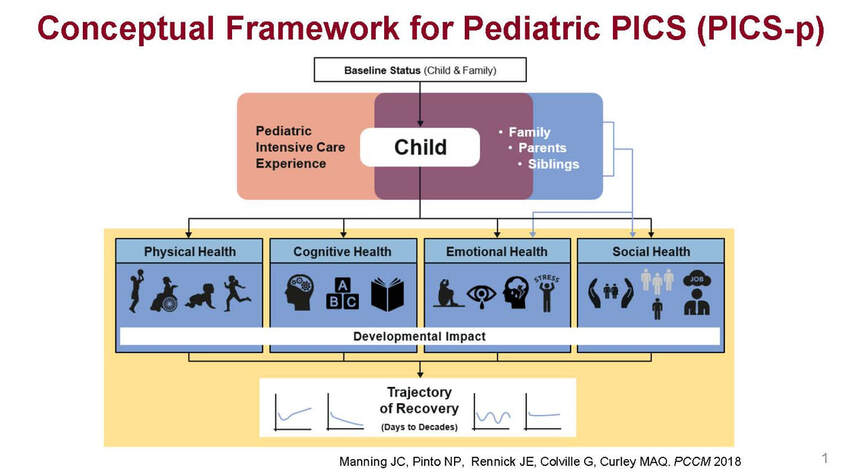Post Intensive Care Syndrome (PICS-p) Framework
Permission to use the PICS-p Framework
You are free to use the Post Intensive Care Syndrome (PICS-p) Framework for research or clinical practice. The PICS-p Framework may be reproduced on forms with hospital or clinical unit letterhead or logos, or used in electronic record systems. Please cite: Manning, J.C., Pinto, N.P., Rennick, J.E., Colville, G., Curley, M.A.Q. (2018). Conceptualizing Post Intensive Care Syndrome in Children- The PICS-p Framework. Pediatr Crit Care Med, 19(4), 298-300. If you would like to republish the tool in any form external to your organization you will have to obtain permission from the copyright holder - Pediatric Critical Care Medicine. Requests for any changes or alterations to the framework or requests to translate it into another language should be made in writing to Dr. Curley. MAQCurley@gmail.com.
Abstract
Context: Over the past several decades, advances in pediatric critical care have saved many lives. As such, contemporary care has broadened its focus to also include minimizing morbidity. Post Intensive Care Syndrome, also known as “PICS,” is a group of cognitive, physical, and mental health impairments that commonly occur in patients after ICU discharge. Post Intensive Care Syndrome has been well-conceptualized in the adult population but not in children.
Objective: To develop a conceptual framework describing Post Intensive Care Syndrome in pediatrics that includes aspects of the experience that are unique to children and their families.
Data Synthesis: The Post Intensive Care Syndrome in pediatrics (PICS-p) framework highlights the importance of baseline status, organ system maturation, psychosocial development, the interdependence of family, and trajectories of health recovery that can potentially impact a child’s life for decades.
Conclusion: Post Intensive Care Syndrome in pediatrics will help illuminate the phenomena of surviving childhood critical illness and guide outcomes measurement in the field. Empirical studies are now required to validate and refine this framework, and to subsequently develop a set of core outcomes for this population. With explication of Post Intensive Care Syndrome in pediatrics, the discipline of pediatric critical care will then be in a stronger position to map out recovery after pediatric critical illness and to evaluate interventions designed to mitigate risk for poor outcomes with the goal of optimizing child and family health.
Objective: To develop a conceptual framework describing Post Intensive Care Syndrome in pediatrics that includes aspects of the experience that are unique to children and their families.
Data Synthesis: The Post Intensive Care Syndrome in pediatrics (PICS-p) framework highlights the importance of baseline status, organ system maturation, psychosocial development, the interdependence of family, and trajectories of health recovery that can potentially impact a child’s life for decades.
Conclusion: Post Intensive Care Syndrome in pediatrics will help illuminate the phenomena of surviving childhood critical illness and guide outcomes measurement in the field. Empirical studies are now required to validate and refine this framework, and to subsequently develop a set of core outcomes for this population. With explication of Post Intensive Care Syndrome in pediatrics, the discipline of pediatric critical care will then be in a stronger position to map out recovery after pediatric critical illness and to evaluate interventions designed to mitigate risk for poor outcomes with the goal of optimizing child and family health.
PICS-p Framework

Post Intensive Care Syndrome in pediatrics (PICS-p) framework. The critically ill child, the focus of our attention, presents to the PICU exhibiting varying levels of health at baseline. The child experiences the PICU within their family unit that includes parents and often siblings. All experience the PICU and require consideration at the family, parent, and sibling level. On PICU discharge, the physical, cognitive, emotional and social health of the child varies and is influenced by the child’s pre-PICU state, development, and maturation as well as the natural course of a child’s underlying illness. Family, parent, and siblings’ emotional and social health may also be affected. The trajectory (y-axis) and duration (x-axis) of recovery is variable and may improve, deteriorate, vacillate, or remain static over days or decades.
Available PICS-p Framework Translations
French: |
| ||||||
German: |
| ||||||
Greek: |
| ||||||
Latvian: |
| ||||||
Spanish: |
| ||||||
Turkish: |
| ||||||
Articles of Interest
|
Manning, J.C., Pinto, N.P., Rennick, J.E., Colville, G., Curley, M.A.Q. (2018). Conceptualizing Post Intensive Care Syndrome in Children- The PICS-p Framework. Pediatr Crit Care Med, 19(4), 298-300.
|
| ||||||